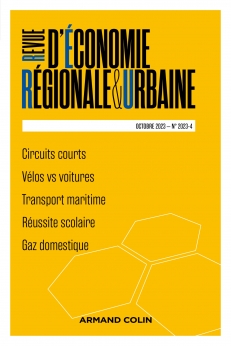
REVUE D'ÉCONOMIE RÉGIONALE ET URBAINE (4/2023)
Pour acheter ce numéro, contactez-nous
Recevez les numéros de l'année en cours et accédez à l'intégralité des articles en ligne.
Nous étudions les déterminants de la réussite scolaire des jeunes en Nouvelle-Calédonie, petite économie insulaire du Pacifique Sud, fortement marquée par les inégalités. En effet, les institutions publiques, notamment éducatives, mettent en place des mesures importantes pour réduire les inégalités, dans un contexte de décolonisation et d’autonomie de ce territoire ultramarin français. Ainsi, nous cherchons à comprendre comment les effets de composition des contextes éducatifs peuvent ou non contribuer aux inégalités de performance académique. Nous mobilisons des données administratives exhaustives d’élèves de 3e pour étudier le rôle des caractéristiques individuelles et les effets des contextes scolaires sur la réussite au Diplôme National du Brevet. Nous cherchons à déterminer dans quelle mesure les environnements des classes et établissements peuvent affecter la réussite scolaire des élèves. Outre les caractéristiques individuelles sociodémographiques des élèves, les estimations de modèles multiniveaux montrent des effets-classes plus importants que ceux liés à l’établissement.
In this article, we study the determinants of educational success among young people in New Caledonia, a small island economy in the South Pacific that is strongly associated with disparities. In fact, the public authorities, and in this case the educational institutions are setting up important measures to reduce inequalities, in a context of decolonization and autonomy of this French overseas territory. Thus, we intend to understand how the compositional effects of educational contexts may or may not contribute to academic performance inequalities. More specifically, we explore the extent to which class and school configurations can influence individual academic achievement. The use of a multilevel method allows us to take into account the overlapping structure of the different school environments, which are the classes and colleges. We use an exhaustive administrative database of ninth grade students to study individual characteristics and the effects of school contexts on success in the Diplôme National du Brevet. This first level of diploma delivered by the French school system, allows a level of analysis that considers the whole school population, since at this age, school is still compulsory. On the other hand, studying the weight of structural factors on individual success, from the earliest age, provides information on the needs necessary to establish a more equitable educational system. In addition to the individual socio-demographic characteristics of students, results of multilevel models show that class effects are more important than school effects. Our results show that a student’s probability of graduating increases when he or she shares a class with other students who have high academic performance. On the other hand, the characteristics of the school have little or no significant effect.
